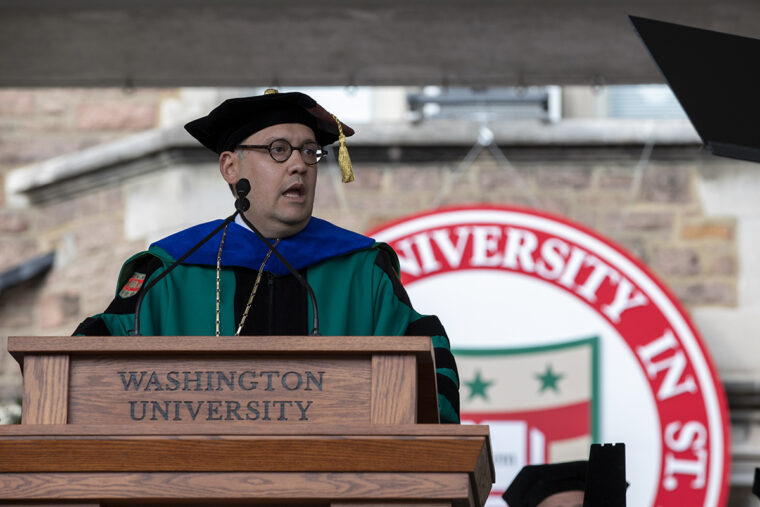
Today, as he was inaugurated as Washington University in St. Louis’ 15th chancellor, Andrew D. Martin announced the WashU Pledge, a bold new financial aid program that will provide a free undergraduate education to incoming, full-time Missouri and southern Illinois students who are Pell Grant-eligible or from families with annual incomes of $75,000 or less.
The WashU Pledge covers the full cost of a Washington University education, including tuition, room, board and fees.
“We are making this ‘WashU Pledge’ first because it’s the right thing to do,” Martin said. “In addition, we are Washington University ‘in St. Louis.’ That means we have a unique responsibility to provide opportunity for students in our extended region — to the four corners of Missouri and our neighbors in the southern portion of Illinois. By doing so, we’re attracting our very best and brightest and keeping them right here, close to home.”
The WashU Pledge reflects Martin’s commitment to advancing efforts to broaden educational access; improve diversity, equity and inclusion; and strengthen the university’s partnerships in St. Louis and across the region. In his inaugural address, Martin noted educational access as one of his three key strategic priorities for the future of the university.
To be eligible for the program, an applicant must be admitted to Washington University as a full-time first-year undergraduate student, reside in the designated area and fit within the financial criteria. Part-time students or students who are earning a degree from University College are not eligible.
During his inaugural address, titled “Momentum,” Martin also announced that for those undergraduate students already enrolled at WashU who would qualify, they, too, will benefit from this pledge beginning in fall 2020.
Martin noted that the WashU Pledge will not only enhance the accessibility and affordability of a Washington University undergraduate degree, but also will deliver economic benefits to the St. Louis region.
“Our hope and expectation is that these students will come to the university, have an exceptional experience and — then — post-graduation choose to stay in the region to work, start their own businesses, conduct important research or practice their craft,” Martin said. “This will boost the St. Louis regional economy and deepen our local talent pool.”
Ronné Patrick Turner, vice provost of admissions and financial aid, said the WashU Pledge will support another key area of focus at the university — academic distinction.
“Our goal is to recruit the best and the brightest students regardless of their ability to pay,” Turner said. “The WashU Pledge will allow us to attract students throughout Missouri and southern Illinois who may have thought, in the past, that a WashU education wasn’t possible. This commitment removes any and all financial constraints and makes it clear that our doors are open to these students. We hope they will join us.”
Series of initiatives
The WashU Pledge is the latest in a series of initiatives to make Washington University more affordable. Earlier this year, Washington University launched startup and technology grant programs for students from families with annual incomes of $75,000 or less. The grants cover the cost of computers, books and other college necessities such as winter clothing and housing supplies.
During the recently completed Leading Together capital campaign, Washington University raised $591 million for student scholarships and fellowships, substantially increasing resources for student financial aid.
The university has made substantial progress in attracting and enrolling Pell-eligible students, growing the number from 6% in 2013 to 15% in 2019. At the same time, the university has introduced a number of resources and programs to ensure these students succeed and have the full Washington University experience. New initiatives include:
- The Student Success Fund, which covers the cost of travel to interviews, academic fees, and medical and living expenses incurred during an unpaid internship.
- Deneb STARS, a cohort program that provides community and support to Pell-eligible and first-generation students through academic and peer mentors.
“At Washington University, we are not just committed to getting students to college, we are committed to creating a culture where everyone thrives,” Martin said. “Our message is simple: ‘Every Washington University student belongs here and we all are committed to their success.’”
This was originally published by Washington University in St. Louis on October 3, 2019.